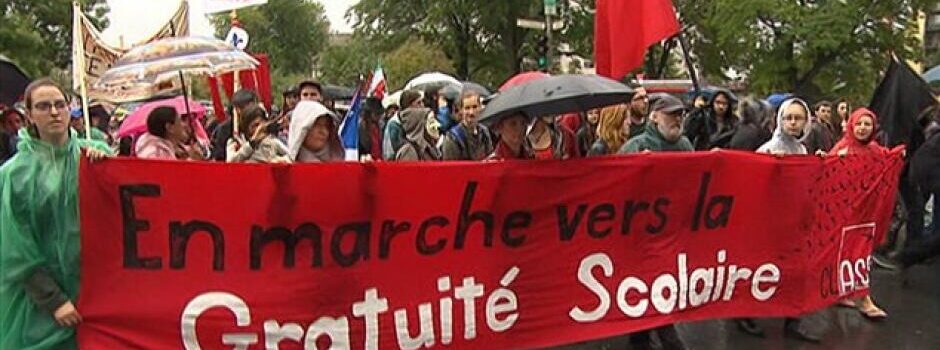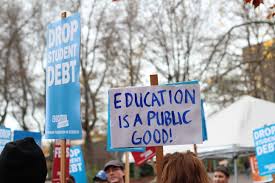Our Generation Needs to Take up the Fight for Education for all!
Central Executive Committee YCL-LJC
“A schoolmaster is a productive labourer when, in addition to belabouring the heads of his scholars, he works like a horse to enrich the school proprietor. That the latter has laid out his capital in a teaching factory, instead of in a sausage factory, does not alter the relation.”
Das Kapital, Karl Marx
Post-secondary education (PSE) in Canada has reached a crisis point. This crisis is demonstrable by the recent announcement by the federal government of a cap on international student enrollment in addition to the news that many PSE institutions are running substantial budget deficits.
Notably, Queen’s University in Ontario announced that in response to their projected budget deficit, they will introduce major cuts. Queen’s Provost Matthew Evans stated at a December town hall, “I’m concerned about the survival of this institution. Unless we sort this out, we will go under”. The cuts include eliminating all undergraduate courses with less than 10 students next year, introducing a hiring freeze, and laying off adjunct professors. The cuts at Queen’s are being introduced despite the university having the fifth largest university endowment in the country, valued at over $1.4 billion. Additionally, Queen’s has $600 million of accumulated surplus compared to a $62 million projected deficit pre-cuts or $48 million post-cuts.
Nearly half of universities in Ontario, 10 out of the province’s 23 public universities, are facing fiscal deficits this year.
In October of last year, the Quebec government made the controversial decision to increase tuition for Canadian students from outside Quebec from $8,992 a year to $17,000, while international students would pay a minimum of $20,000. The move was made under the auspices of protecting the French language. However, the impact will not just be on the out-of-province students at the three English-language universities in Quebec, but first and foremost on Franco-Canadian students who rely on the Quebec PSE system due to inadequacies in their home provinces.
The Canadian immigration system is designed to maintain an abundance of temporary immigration statuses in order to ensure a steady supply of precarious, non-union, low-wage workers to tamp down wages and working conditions for all. Universities, colleges, and a growing number of private institutions have been using international students as a replacement for dwindling public financial support, since international students pay higher tuition fees. The international student cap has been introduced because the ruling class does not have the same need for expanding the reserve army of labour to put a downward pressure on wages. Now inflation is getting the job of reducing wages done for them. Reducing international student enrollment can help manufacture a crisis in PSE so they can undergo corporatised restructuring and accelerate the commodification and exclusivity of education as we have already seen at Laurentian University.
The ruling class will have us believe the roots of this crisis lay in tuition fees not rising fast enough or ‘inefficiencies’ such as workers salaries. But the truth is the crisis stems from the general crisis of capitalism. We are in this position because of decades of underfunding from provincial and federal governments of all political stripes as well as the corporate leadership of PSE institutions pushing for a commodification of education.
The expansion of for-profit colleges and universities, including their partnerships with public schools, leads to an unacceptably low quality of education. It also changes the dynamic from a merit-based system to a consumer-oriented one, where students see PSE as a financial investment that opens the door to a higher salary, rather than viewing PSE as an opportunity to develop critical thinking as well as important technical skills.
We have already seen provincial governments in Ontario, Alberta, and Manitoba introduce “performance-based” funding in which public funding would be pinned to labour market needs. Under this scheme, PSE institutions would no longer receive funding based on enrollment, an arrangement that is already inadequate especially for smaller institutions and those in areas outside major urban centres. Instead they would be financially supported according to student outcomes such as hiring rates and employment earnings. Without a doubt, this will benefit professional programs and those that are linked with specific industrial entities at the direction of the school’s board of governors who come from Bay Street and big business. Performance-based funding will come at the expense of a huge range of liberal arts, humanities and languages programs, and critical intellectual inquiry.
This crisis will not only affect current and future students. PSE is a major industry in all provinces. The economy of Canada relies on having an educated pool of labour. The majority of people in Canada have received some form of post-secondary accreditation. According to the OECD, Canada’s population has the highest rate of tertiary education completion in the world. PSE accounts for more than $40 billion in government revenue annually or approximately 1.2 percent of the GDP of Canada. In Ontario alone, it is estimated that the economic impact of its 21 public universities and 24 public colleges is more than $120 billion a year. The PSE sector in Canada directly employs more than 440,000 people across the country and contributes another 300,000 indirect jobs.
What is needed now is a serious investment of public funds into PSE. The reliance on tuition fees, particularly from international students, over public funds has created an unsustainable funding model that is leading to a major contraction of the PSE sector.
Public funding to PSE in Canada has been slashed from 80 percent 30 years ago to under 50 percent today. Public funding for PSE has been stagnant or decreasing for more than a decade, despite soaring inflation. From 2008 to 2020, student enrolment increased by more than 20 percent whereas income from tuition rose by nearly 70 percent across Canada. Big business, which dictates most of government policy, has made it clear that it is not concerned with expanding access to quality education in Canada. The capitalists are lobbying hard to limit access and take direct control over universities and colleges.
We must fight for an expansion of quality and accessible education for all. The layoffs and tuition hikes being proposed by administrations across the country will exacerbate the crisis, not resolve it.
We cannot fall for the cynical traps offered by the bourgeoisie — the argument that liberal arts education is a luxury, that only “employable” studies should be offered, or that free education will subsidize the wealthy by taxing workers.
Our role as young communists in the broad student movement is to build unity in action, inject ideas of class struggle, and try to navigate away from adventurous or reformist dead ends. Student unions and their federations have been moving away from their necessary role as fighting bodies to becoming service providers for dental plans or ISIC cards. As the YCL-LJC, we must put forward the demand for a public monopoly on PSE that provides free education for all. Our clubs that are based on campuses must work to build up a student movement that can stand with workers and their unions against cuts in classes and services; that can fight against tuition hikes; that can mobilize students in the hundreds of thousands like we have seen before in this country.
Ultimately, our role is to build the fight for socialism, which will provide a real barrier-free democratic and emancipatory education for all that work for it.
“The Communists have not invented the intervention of society in education; they do but seek to alter the character of that intervention, and to rescue education from the influence of the ruling class.”
Manifesto of the Communist Party, Marx and Engels









